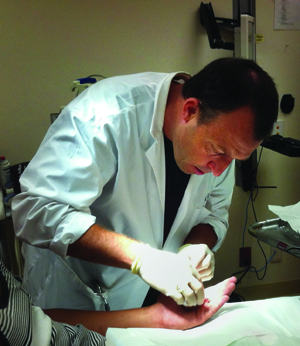From the ER to State Senate and Back
Sen. Josh Green heals broken bodies and ailing health care in Hawaii

Hawaii senator/physician Josh Green stitches up a surfer in the emergency room.
It was on a train somewhere between Madras and Delhi that Josh Green ’92 decided he wanted to become a doctor. After a tough first year at Swarthmore, Green applied for a grant to spend a semester abroad and ended up being recruited to spend a semester at sea as a research assistant to bird-migration scholar and Professor of Biology Timothy Williams, who was sailing around the world tracking the migratory flight paths of various bird species.
“I had a lot of latitude to travel when we were in port, so I took the third-class, three-day train trip, from southern India to Delhi,” he recalls. Seeing people on the train with extreme disabilities, he pledged to return to Swarthmore, strive for top grades, and get into medical school. Back at the College in the spring, he became a model student.
He continued his trajectory at Penn State College of Medicine, followed by a three-year family-practice residency at the University of Pittsburgh Medical Center that included a final year as rotating chief resident. Since India, he’d considered taking his primary-care training to a medically disadvantaged rural community—“some place that needed me.”
So in 2000, he joined the National Health Service Corps (NHSC), which awarded him a scholarship to pay off his medical-school loans on the condition that he commit to a four-year stint in an underserved region. He found himself in the southernmost district of the Big Island of Hawaii. In this stark and ruggedly beautiful region that encompasses a large part of Hawaii Volcanoes National Park, Green became the sole family physician for approximately 8,000 inhabitants.
A few years later, disturbed by “the incredible challenges posed by the drug problems in the countryside of Hawaii as well as the shortage of physicians, I decided to run for office,” he explains. In late 2004, Green, a Democrat, was elected to the Hawaii House of Representatives.
“In my job as an ER doctor, I constantly saw the crisis points in our health-care system,’ he says. “I served two terms in the House of Representatives and then was encouraged to run for the [state] Senate.”
Green admits that a double life as physician and legislator poses certain challenges. Time is the greatest of them. At the outset, he transitioned his medical practice hours from the health center to the emergency room, knowing that as a state representative he’d be absent for five months each year. “I needed a schedule that didn’t disrupt the lives of patients,” he says.
Now, “for 45 weeks a year from Monday 8 a.m. until Friday afternoon, I serve as a legislator on Oahu, then I fly over to the Big Island and do a 48- or 60-hour ER shift,” he says. Green also sandwiches in time with his wife and two children and service to the College’s Alumni Council, for which he has never missed a meeting during seven years as a member. It’s a hard balancing act “but it’s satisfying to continue to have firsthand experience with the health problems in my state,” he says.
Green’s dual commitment to healing and legislating has led to major kudos. In 2009, a year after he became a state senator, he was named Hawaii Physician of the Year. This year he was named legislator of the year by the Healthcare Association of Hawaii. For the last two years, he has chaired the Senate Health Committee.
“It’s been an interesting time to be chairperson, because at the same time that Congress has taken up national health-care reform, I’ve been able to see parallels in a state that essentially insures everyone,” Green says, adding that both full- and half-time employees and their families receive full coverage in the state courtesy of Hawaii’s 1974 Prepaid Healthcare Act.
“Hawaii, in some ways, preceded the national health-care reform in its approach to getting people coverage and access to care,” he continues. “And since 2010, I’ve been able to pick and choose the best parts of the Affordable Care Act [ACA] and apply them to Hawaii. We are seeing major change, moving to an outcome-based health-care system, shifting from a system that pays for surgeries and end-stage disease to one that pays for wellness and preventive health care.”
And influenced by the positive experiences he had in the National Health Corps, in combination with the ACA provisions, Green created a health-care law for his state, which passed in May and will provide loan reimbursement for medical professionals.
“We aim to be the one state in the country where anyone committed to primary care will be eligible for loan reimbursement, so that Hawaii will have no shortage of primary-care physicians, nurse practitioners, or other health providers,” he says.
 Email This Page
Email This Page